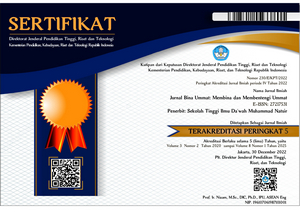THE EFFECT OF ORIENTALISM: THE CHALLENGE OF DA'WAH FOR ISLAMIC UNIVERSITY IN INDONESIA
DOI:
https://doi.org/10.38214/jurnaldawahstidnatsir.v5i1.127Keywords:
Orientalists, da'wah, Islamic colleges, liberalismAbstract
The purpose of this study is to reveal the influence and dangers of orientalism at Islamic universities in Indonesia. Research method with qualitative approach. The research results or findings from this study are many Islamic universities in Indonesia have been infected and influenced by Orientalist understanding in understanding religion. Orientalist methodologies and scholarship have been widely used and taught in Islamic campuses without any criticism and adjustment to Islamic teachings. So that it has an impact on the understanding and perspective of students and lecturers on Islamic campuses, there are those who then think that all religions are true, it is permissible to marry between different religions, you can't be panicky about religion, question the authenticity of the Qur'an and other understandings of relativism. Of course, these kinds of ideas deviate from the teachings of Islam which is perfect from all sides. Then it becomes a challenge and obligation for Islamic universities to refer back to important concepts in every Islamic discipline and apply it in the context of contemporary sciences in response to 'scientific' approaches this modern era.
Published
Versions
- 2024-08-25 (3)
- 2022-07-24 (1)
How to Cite
Issue
Section
Copyright (c) 2022 Lukman

This work is licensed under a Creative Commons Attribution 4.0 International License.
This work is licensed under a Lisensi Creative Commons Atribusi 4.0 Internasional.
Authors who publish with this journal agree to the following terms:
- Authors retain copyright and grant the journal right of first publication with the work simultaneously licensed under a Creative Commons Attribution License that allows others to share the work with an acknowledgment of the work's authorship and initial publication in this journal.
- Authors are able to enter into separate, additional contractual arrangements for the non-exclusive distribution of the journal's published version of the work (e.g., post it to an institutional repository or publish it in a book), with an acknowledgment of its initial publication in this journal.
- Authors are permitted and encouraged to post their work online (e.g., in institutional repositories or on their website) prior to and during the submission process, as it can lead to productive exchanges, as well as earlier and greater citation of published work (See The Effect of Open Access).




